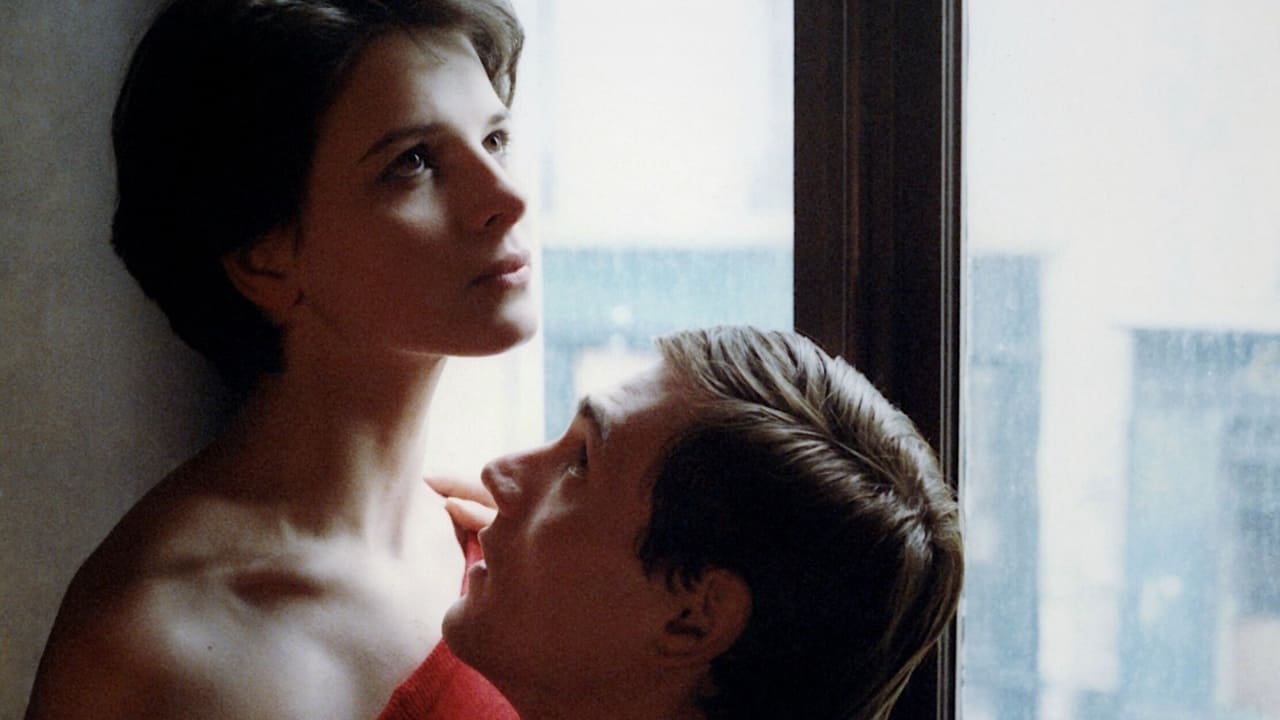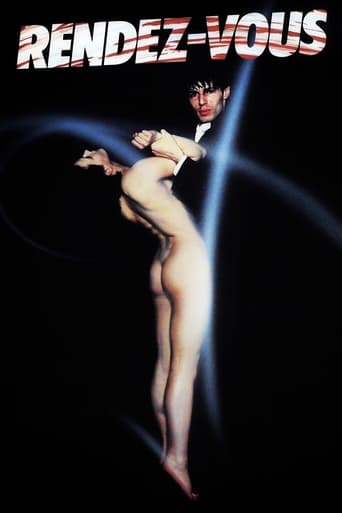Protraph
Lack of good storyline.
CommentsXp
Best movie ever!
Phillipa
Strong acting helps the film overcome an uncertain premise and create characters that hold our attention absolutely.
Staci Frederick
Blistering performances.
julievignondecourcy
There is very mixed opinion on here surrounding Rende-Vous and I was unsure how I feel about the film seeing it 15 years after my first viewing. I needn't have worried I found the film to be an excellent, psychological drama with riveting central performances.Released in 1985, today the film looks dated, but its focus and themes remain as vibrant as ever. Juliette Binoche gives a startlingly memorable debut as Nina, the provincial actress who in attempting to grasp hold of her destiny is instead cruelly manipulated by circumstance.I had to smile at the review criticizing her reading of the lines for Romeo & Juliet as being absolutely awful. The fact is that they were supposed to be awful (so in that way the film and Binoche succeed). Nina is a headstrong young girl, but nothing in the film suggests she has any sort of talent in terms of acting, until she meets Scrutzer and can find the emotional maturity necessary to play Juliet. There is of course irony here: Why is there a need for emotional maturity when playing a teenager? The answer of course lies with one of the most important themes at play here: that artistic maturity can only be achieved through real experience - in this case the loneliness and grief Nina needs to experience to come to terms with the character of Juliet.That the first part of the film and the love-triangle it establishes and cruelly destroys facilitates this is where the film finds it's strength. It's through a coincidence of circumstance that Nina and Scrutzler come to meet in the first place. Had that not happened Nina would not have experienced much of the misery in her life, nor the maturity she later grasps.The first part of the film is stunningly tight with Techine tightly creating a sense of obsession among the three main characters (Nina, Quentin and Paulo). This sort of focus is missing from Techine's later films such as Les Temoins, Alice et Martin and Loin and had he displayed the same control on those as he does here they would have been even better for it.As the story arcs and Trintignant's Scrutzler comes to the fore the film finds it's final equilibrium as do the characters. This is not the stuff of happy endings, but is instead that of realization and in the case of the actress emotional recollection which empowers her ability to perform.In her leading debut Binoche is very strong, it's not hard to see why the French press were so excited by her in this role and why it opened the path to her (still) magnificent career. She creates in Nina a figure of pathos mixed with a coarse ignorance that is slowly eroded to reveal a significant intellect and talent - on stage and off, on screen and off.
Red-125
Rendez-vous (1985) was co-written and directed by André Téchiné. It's a vehicle for the now-famous Juliette Binoche.Juliette Binoche, at age 21, already radiated the star power that became apparent to everyone in "The Unbearable Lightness of Being." Unfortunately, her contributions to this film were pretty much limited to her luminous skin and her distinctive beauty. This distinctive beauty is fully and totally displayed. (Binoche is not shy.)The film involves four men who swirl around Binoche like the proverbial moths around a flame. One is a wimp, one is a creep, and one carries a straight razor. (Don't ask). The fourth is Jean-Louis Trintignant. The other three were all young, and were probably happy to work with a well-known director like Téchiné. One can only guess why an established star like Trintignant accepted this role. Binoche is lovely, especially when dressed in period costume as Shakespeare's Juliet. (She looks like Vivian Leigh in "Gone with the Wind.") However, she is miscast as the wide-eyed young ingénue from the provincial town of Toulouse. Binoche was born in Paris, and she just can't carry off a role in which she is supposed to have just arrived in town to "live her life." Another weak point is her reading of some of Juliet's lines at an casting audition. No actor could read lines that badly. (High school kids trying out for the senior play don't read lines that badly.)The movie will work well on DVD, which is the way I saw it. If you love La Binoche, and you've seen every other film in which she's starred, I guess you'll have to see this one for the sake of completion. If you haven't seen all of her later films, rent one of those instead.
film_ophile
Oh sooooo disappointing. The most helpful thing I can tell you is Don't Bother! Sure, the acting was great, fearless etc etc. but the script was so very baaad. The writer/director et al- they just couldn't decide WHAT to do with this story. Actually, the only really interesting thing for me in this film- is the performance of Lambert Wilson doing a young Jeremy Irons.'I'm sure my film experiences of him are stunted but I have only known him as a comedic/semi-comedic actor.He does a very riveting job as the tortured soul here. But still, there are so many good films directed by Techine or starring these actors; just skip this one.
shatguintruo
The opening scene of this picture, lead us to two experiences, which we already went through, all of we who travel by train: 1)Looking through the window, one glimpses a station coming near and with it the unknown; 2)or: we hope to retie that we left hanging, be it a friendship relation, business, etc... In this opening scene, the director André Téchiné prepares us to the sparkling show up of a young actress who arrives in Paris searching immediate success. However, her personality must be mold (shape) , like one casts a sword in a forge. The first to take the hammer in front of the anvil, is the manager of a stage play in an obscure theater of Paris, who to take advantage of the situation, try to persuade that Nina (juliette Binoche, here in one of her first roles) is an actress with capital "A". The second, Quentin (Lambert Wilson) a tormented boy, who had caused the death of his beloved, assumes the role of "modeler" and keeps "molding" the character of the also newly arrived to the adult age. More another, Paulot (Wadeck Stanczak) at first courteous and later (understanding that Nina only uses people to arrive where she wants) selfish and cruel in his behavior - in view of the real situation - and finally Scrutzler (Jean Louis Trintignant) delineate the frame all the artists must have: the capacity of understand the essence of what the author wrote (do you remember the listless way Nina reads Romeo and Juliet from Shakespeare, without understanding the pain/love of the chief characters?) At the end, sorrowful and not counting with those who "support" her, she starts to upgrade to the human improvement, which is only available by pain. One movie that I classify - in a scale from 1 to 10 - as grade 9 (excellent).

